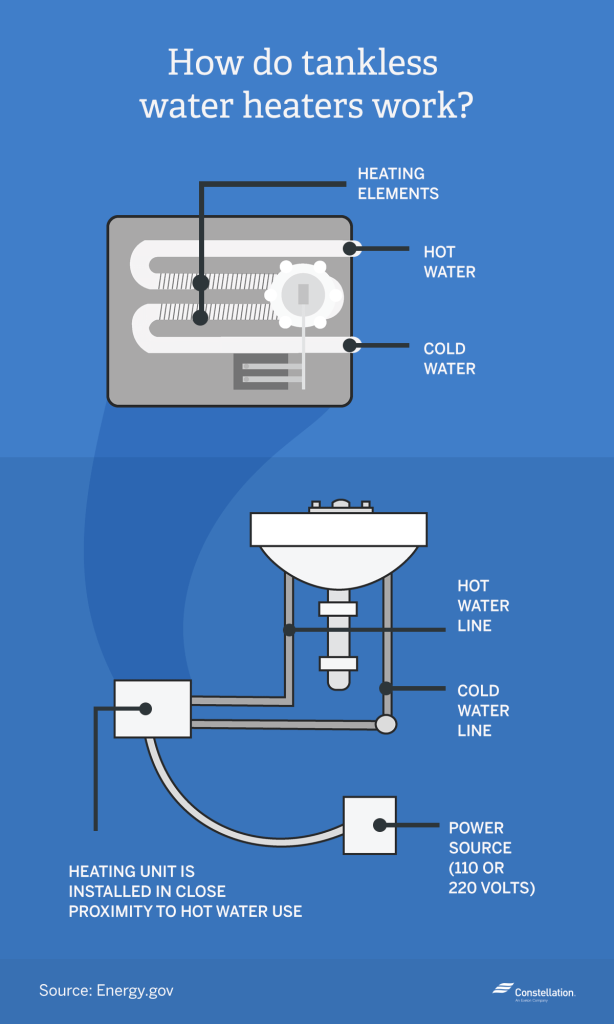The Main Principles Of The Maintenance Requirements for a Tank vs. a Tankless Water Heater

Choosing the ideal style of water heater for your home can easily be a daunting activity. With thus several options on call, it's necessary to take into consideration your demands and inclinations before producing a decision. In this message, we'll cover the various types of water heating systems readily available and help you determine which one is correct for you.
1. Storage Tank Water Heaters
Storing storage tank water heating systems are the very most typical kind of water heating unit located in homes. They are composed of a big tank that hold hot water until it's required. These storage tanks normally range in measurements coming from 20 to 80 gallons and are heated up by either fuel or electricity.
While storage space tank water heaters are fairly economical to buy and put up, they have some setbacks. To begin with, they take up a great deal of space and may not be suited for small properties or homes. In addition, they can easily lose power by constantly reheating water that might not be used for hours or even days.
2. Tankless Water Heaters
Tankless water heating units, likewise understood as on-demand water heaters, warmth water as it moves with the system rather than saving it in a storage tank. They're normally powered by gasoline or power and may provide an limitless supply of warm water.
One major perk of tankless water heating units is their space-saving layout. They're considerably much smaller than storing storage tank versions and can be positioned on wall structures or installed in tight areas like closets or cupboards.
However, View Details tend to be more pricey upfront reviewed to storage space containers. Also, they may need added customizations to your house's plumbing system unit because they require much higher flow prices to heat the very same volume of very hot water as a storage container model.
3. Heat Pump Water Heaters
Warmth pump water heaters operate by moving heat from the sky or ground in to the unit's storing storage tank to heat the water inside. They're exceptionally effective since they use electric power simply to move warm somewhat than generate it directly like traditional power models.
While heat pump designs set you back more upfront than storage storage tanks, they can save individuals up to 50% on their water heating bills over opportunity. They're also even more environmentally helpful since they don't rely on fossil fuels like gas-powered designs.
Nonetheless, warmth pump versions need a much larger room than storage space tanks and may not be ideal for little houses or flats. They likewise tend to take a lot longer to heat up water compared to other types of heating systems, which could be a setback for some house owners.
4. Solar Water Heaters
Solar water heating systems depend on the sunlight's energy to warm water rather than electrical energy or gas. They consist of sunlight collection agencies that are mounted on your rooftop and a storage tank that save the heated water until it's needed.
While solar models can easily be expensive upfront, they're extremely energy-efficient and can easily save property owners a notable quantity of money in the long run. Additionally, many states provide tax rewards or refunds for property owners who put up photo voltaic water heaters.
Nonetheless, solar versions may not be ideal for all temperatures since they call for straight direct sunlight to work appropriately. Furthermore, they might need to have added backup systems like electricity or gas-powered heaters in the course of time periods of reduced direct sunlight or high requirement.
5. Shrinking Water Heaters
Shrinking water heating systems are similar to conventional storage space storage tank versions but possess an added component that bounces back waste warm coming from exhaust gases before they leave behind the system. This produces them considerably a lot more efficient than standard gas-powered styles since they use less fuel to produce hot water.
While shrinking styles tend to set you back even more upfront than standard gas-powered storage tanks, their efficiency can easily save house owners hundreds of dollars each year in electrical expenses.
Nonetheless, shrinking designs call for a bigger area than conventional storage tanks and may not be appropriate for little houses or houses with minimal space for installment.
Final Thoughts
Choosing the right kind of water heating unit relies on your needs and tastes as effectively as your finances and home's facilities. Think about factors such as on call space, energy effectiveness scores, and installation requirements just before making a selection.
Through taking the time to research and compare different versions, you can discover a water heating unit that satisfies your requirements and supplies reliable hot water for years to come.

